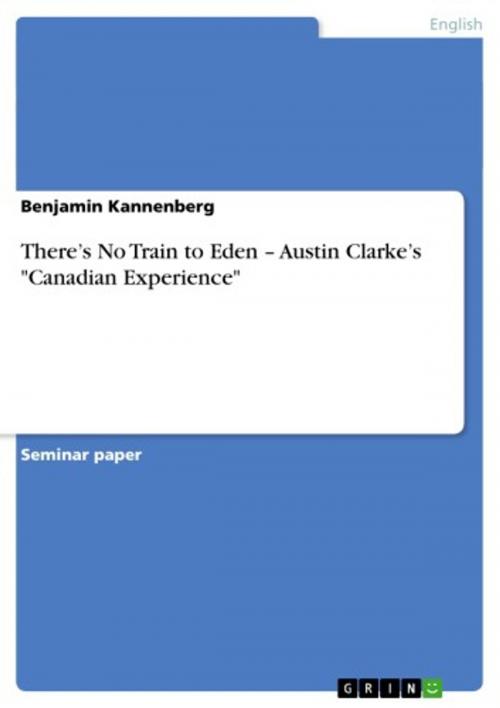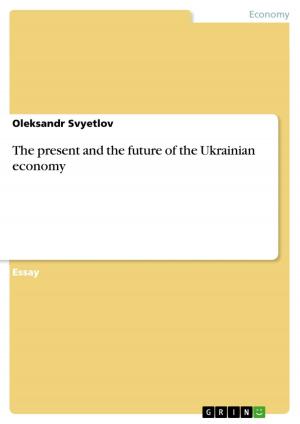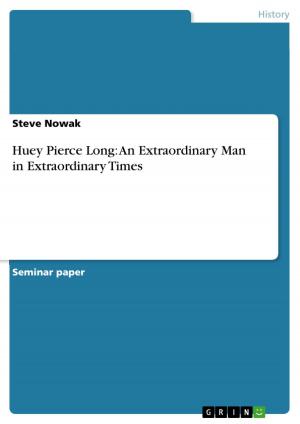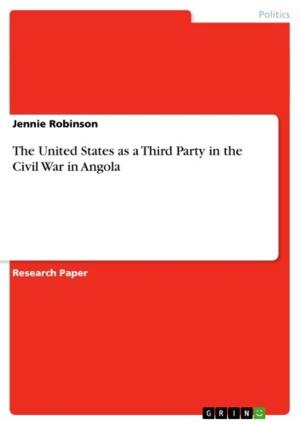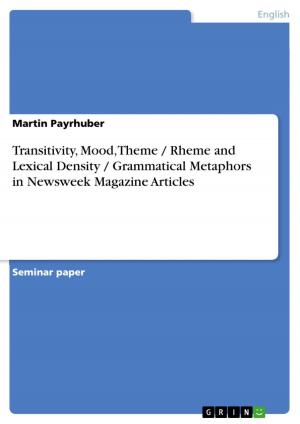There's No Train to Eden - Austin Clarke's 'Canadian Experience'
Nonfiction, Entertainment, Drama, Anthologies| Author: | Benjamin Kannenberg | ISBN: | 9783640170197 |
| Publisher: | GRIN Publishing | Publication: | September 22, 2008 |
| Imprint: | GRIN Publishing | Language: | English |
| Author: | Benjamin Kannenberg |
| ISBN: | 9783640170197 |
| Publisher: | GRIN Publishing |
| Publication: | September 22, 2008 |
| Imprint: | GRIN Publishing |
| Language: | English |
Seminar paper from the year 2007 in the subject American Studies - Literature, grade: 1,3, University of Constance, course: Canadian Literary Theory, 7 entries in the bibliography, language: English, abstract: In 1971, Canada became the first nation which officially adapted an official multiculturalism policy, thereby emphasizing its importance in a modern world. Until today, Canada sees itself as a precursor in respect to interaction with immigrants, partly due to the fact that it is a country which consists of only immigrants, except for the Inuit and First Nations. In Austin Clarke's short story Canadian Experience, we get to know the struggles and thoughts of a young man who emigrates from Barbados to Canada, hoping for a better life in a country that seems to be welcoming. But he is not able to experience Canada's embrace: the hands which hold him back are his own, black ones. Clarke's story is abundant with imagery and narratives linked to the 'Canadian Dream', the dream that everyone is welcomed with open arms. The protagonist embodies this dream and the falling apart of its implementation. Robert Kroetsch states in his book The Lovely Treachery of Words that 'Canadians cannot agree on what their meta-narrative is'.1 By meta-narrative he understands the 'assumed story'2 upon which almost all literary productions are based and are influenced. I believe that one of the major Canadian meta-narratives is multiculturalism. Yet, in agreement with Kroetsch, it cannot be considered to be a unifying element in respect to the Canadian identity, as it seperates the different layers of cultural heterogeneity instead of uniting diverse cultural backgrounds.
Seminar paper from the year 2007 in the subject American Studies - Literature, grade: 1,3, University of Constance, course: Canadian Literary Theory, 7 entries in the bibliography, language: English, abstract: In 1971, Canada became the first nation which officially adapted an official multiculturalism policy, thereby emphasizing its importance in a modern world. Until today, Canada sees itself as a precursor in respect to interaction with immigrants, partly due to the fact that it is a country which consists of only immigrants, except for the Inuit and First Nations. In Austin Clarke's short story Canadian Experience, we get to know the struggles and thoughts of a young man who emigrates from Barbados to Canada, hoping for a better life in a country that seems to be welcoming. But he is not able to experience Canada's embrace: the hands which hold him back are his own, black ones. Clarke's story is abundant with imagery and narratives linked to the 'Canadian Dream', the dream that everyone is welcomed with open arms. The protagonist embodies this dream and the falling apart of its implementation. Robert Kroetsch states in his book The Lovely Treachery of Words that 'Canadians cannot agree on what their meta-narrative is'.1 By meta-narrative he understands the 'assumed story'2 upon which almost all literary productions are based and are influenced. I believe that one of the major Canadian meta-narratives is multiculturalism. Yet, in agreement with Kroetsch, it cannot be considered to be a unifying element in respect to the Canadian identity, as it seperates the different layers of cultural heterogeneity instead of uniting diverse cultural backgrounds.
